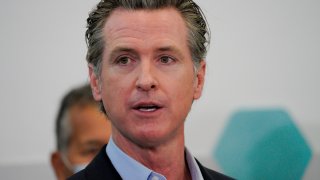
Caitlyn Jenner joined a growing list of candidates seeking to replace California Gov. Gavin Newsom should voters remove him in a recall election in the midst of his first, four-year term. Recall organizers appear to have sufficient petition signatures to place the election on the ballot, and the vote would likely take place later this year. Here’s how it works:
WHAT IS A RECALL ELECTION?
California is one of 20 states that have provisions to remove a sitting governor in a recall, 19 through elections. The state law establishing the rules goes back to 1911 and was intended to place more power directly in the hands of voters by allowing them to recall elected officials and repeal or pass laws by placing them on the ballot. Recall attempts are common in the state, but they rarely get on the ballot and even fewer succeed. However, in 2003, Democratic Gov. Gray Davis was recalled and replaced with Republican Arnold Schwarzenegger.
WHY IS THERE A RECALL DRIVE AGAINST NEWSOM?
The answer is both simple and complicated.
The simple part: Californians are angry. A year of whipsaw pandemic lockdowns, crushing job losses from business closures, shuttered schools and the disruption of daily life has soured just about everybody. Many of life’s routines were cut off at some point if not altogether, whether trips to the beach or lunches at a favorite burger joint.
The complicated part: In a state with nearly 40 million people, there are many grievances, from California’s wallet-sapping taxes to a raging homelessness crisis that continues unabated despite billions in spending. As governor, Newsom has become the target of that resentment.
Local
He’s also being hit by the fallout from a multibillion-dollar fraud scandal at the state unemployment agency while weathering a public shaming for dining out with friends and lobbyists at an exclusive San Francisco Bay Area restaurant last fall, while telling residents to stay home for safety.
Newsom, who was elected in a 2018 landslide, sees the recall as an attack on California’s progressive policies. Republicans see a rare opportunity to unseat a Democrat in a state where the GOP hasn’t won a statewide election since 2006.
Get a weekly recap of the latest San Francisco Bay Area housing news. Sign up for NBC Bay Area’s Housing Deconstructed newsletter.
WHERE DOES IT STAND?
Supporters of the recall are required to gather 1,495,709 petition signatures to authorize the election. They submitted 2.1 million signatures and county election officials must complete their reviews of them by Thursday. Newsom didn’t wait for verification that critics had enough signatures. He kicked off his campaign last month, acknowledging the election was all but inevitable and labeling its organizers as political extremists loyal to former President Donald Trump. The recall is backed by state and national Republicans but organizers argue they have a broad-based coalition, including many independents and Democrats.
WHEN WOULD AN ELECTION BE HELD?
There is wiggle room in the law and numerous steps along the way, but if supporters collect sufficient signatures, it’s likely to be in the fall, possibly in November. The date might not be finalized until September.
HOW DOES THE ELECTION WORK?
Voters would be asked two questions: First, should Newsom be removed, yes or no? The second question would be a list of replacement candidates from which to choose. Provided a majority votes yes on the recall, the candidate who gets the most votes becomes governor. With dozens of candidates expected, it’s very likely a winner will get less than 50% of the votes.
WHAT REPLACEMENT CANDIDATES HAVE ENTERED THE RACE?
Jenner, a Republican, is the latest and the one with by the most name recognition, though she is a political neophyte. Other Republicans include Kevin Faulconer, the former mayor of San Diego; businessman John Cox, who was soundly defeated by Newsom in 2018; and former Congressman Doug Ose. Another name that has been discussed in GOP circles is Richard Grenell, who was acting director of national intelligence in the Trump administration.
WHAT IS NEWSOM SAYING ABOUT THE RECALL?
For months, Newsom steered around questions about a possible election that could remove him from office, saying he wanted to focus on the coronavirus, vaccinations and reopening schools. But he’s now shifted into an aggressive campaign strategy, fundraising, running an ad attacking the recall and doing national TV and cable interviews. He has acknowledged that people are anxious and weary after a difficult year dealing with the virus and restrictions. But he argues that the recall is not about the virus response, but an effort by political extremists on the far-right fringe of the GOP to push him from office.
HOW PRECARIOUS IS NEWSOM’S HOLD ON HIS JOB?
If petition numbers hold up and a recall election is set, Newsom would be forced to fend off rivals in the midst of a pandemic that has cost the state millions of jobs and shaken life for residents. Many business owners were infuriated by what they saw as Newsom’s heavy-handed restrictions that had some open and close several times.
But conditions have improved in the last two months. Virus cases have plummeted and more than half the state’s population has gotten at least one vaccination dose. All types of businesses have reopened and as infection rates fall they are being allowed to add more customers.
California also is one of the most heavily Democratic states in the country: Democratic voters outnumber Republicans by nearly 2-to-1, and the party controls every statewide office while dominating the Legislature and congressional delegation.



